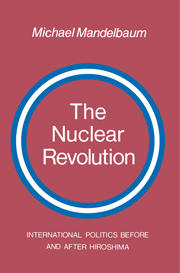Book contents
- Frontmatter
- Contents
- Preface
- 1 The nuclear revolution
- 2 Nuclear weapons and chemical and biological weapons
- 3 The balance of power in the nuclear age
- 4 Arms competition: The nuclear arms race and the Anglo–German naval rivalry
- 5 Arms competition: The nuclear arms race and tariff competitions
- 6 NATO: The nuclear alliance
- 7 The nuclear presidency
- 8 The bomb, dread, and eternity
- Notes
- Index
6 - NATO: The nuclear alliance
Published online by Cambridge University Press: 26 January 2010
- Frontmatter
- Contents
- Preface
- 1 The nuclear revolution
- 2 Nuclear weapons and chemical and biological weapons
- 3 The balance of power in the nuclear age
- 4 Arms competition: The nuclear arms race and the Anglo–German naval rivalry
- 5 Arms competition: The nuclear arms race and tariff competitions
- 6 NATO: The nuclear alliance
- 7 The nuclear presidency
- 8 The bomb, dread, and eternity
- Notes
- Index
Summary
The Atlantic alliance
Anarchy breeds insecurity, which fosters the impulse for selfprotection. This is the logical chain that connects the structure of the international system with the behavior of states, from antiquity to the present. Members of the system can and do draw upon their own resources for protection. When rival states fortify themselves in explicitly competitive fashion, the result is an arms race. States reach out to others, as well, when they feel threatened, seeking to strengthen themselves through alliances, which are as familiar in international politics as arms races.
In Thucydides's account of the Peloponnesian War both Athens and Sparta do both. As they prepared for war, in addition to arming themselves, both “planned to send embassies to the King of Persia and to any other foreign Power from whom they hoped to obtain support, and they tried to ally themselves with other Hellenic states who were not yet committed to either side.” Questions of who would ally with whom take up much of the first part of the account. Alliance politics is a theme that runs throughout the story. Alliances are not only common, they are commonly marriages of convenience. In arms races, interests of particular groups may influence the types and numbers of weapons with which states equip themselves; the necessary condition for any arms race, however, is the rivalry that springs from the structure of the international system. Similarly, alliances may unite states with political or cultural affinities, which can reinforce their mutual commitments. The basis for those commitments, however, is the need for protection, which arises from the anarchical character of international politics.
- Type
- Chapter
- Information
- The Nuclear RevolutionInternational politics Before and after Hiroshima, pp. 147 - 176Publisher: Cambridge University PressPrint publication year: 1981



